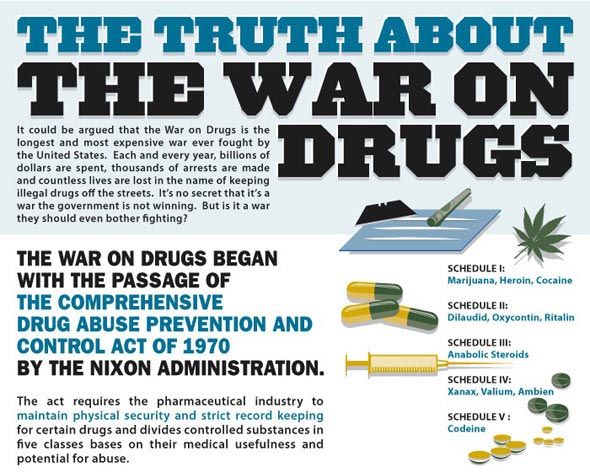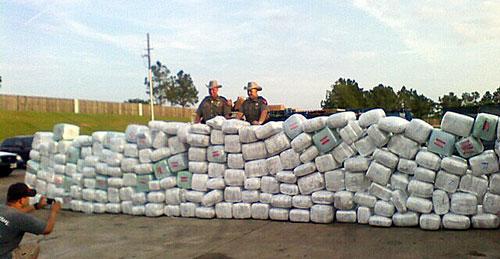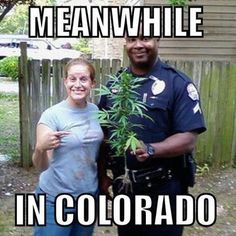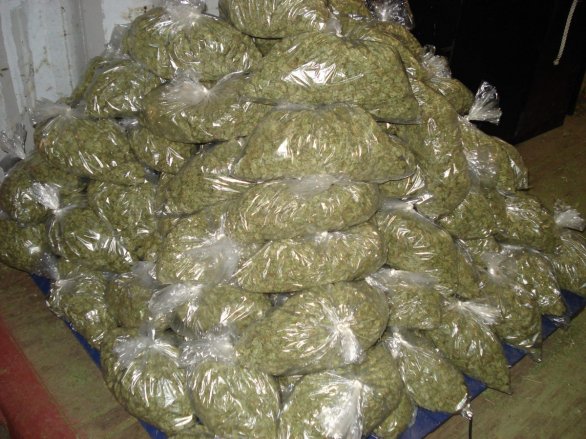They say truth is the first casualty of war, and that’s certainly true of the War on Drugs. News reports and public statements about the recent raids of cannabis flower-forcing operations on Island Mountain point out just how far from reality both sides have gotten lately.
I heard Humboldt County Sheriff’s Deputy Lt. Wayne Hanson explain that they “went to Island Mountain to eradicate marijuana just like we’ve done for the last 30 years.” They still haven’t gotten the memo that cannabis is legal in California, or that millions of Californians have the right to possess it, and businesses all over the state have licenses to distribute it. It’s only been 18 years since prop 215 passed. You can’t expect them to change overnight, especially considering how dependent they’ve become on asset forfeiture for their budget.
At some point, though, someone needs to point out that these kinds of raids no longer constitute law-enforcement, but instead cross over into armed robbery, home invasion, vandalism and terrorism. Like Lt. Hanson said, they’ve been doing this for 30 years. They’ll do it for another 30 years, regardless of what the law says, unless we stop them. No arrests were made. The DA will probably not bring charges, because a jury would not convict, and the jury would not convict because no one complained, no one was injured, and no crime was committed. That is, unless you count what the cops did, as a crime.
Still 100 cops spent all week, including a generous amount of overtime I’m sure, out at Island Mountain making criminal mischief with their newly allocated Measure Z funds. They’re like, “Hey, we’re cops, it’s summertime, what else are we going to do?” This is how cops justify the continuation of the War on Drugs these days. Heavy-handed assaults on unarmed vegetation have always been pointless, but now they have become a cherished tradition that they intend to preserve for future generations.
Hanson made sure to talk up the environmental crimes they uncovered at Island Mountain, like water diversions, illegal grading and water theft, and they dragged folks from the Water Quality and Wildlife Departments along for show, but this raid had all the hallmarks of an old fashioned Drug War style marijuana raid: unnecessary, excessive, and expensive. Obviously our Sheriff’s Department has entirely too much money at its disposal.
I have no doubt that those industrial grow operations on Island Mountain have an enormous impact on the environment, but I’m also sure that Hanson exaggerated the impact, at least as he perceived it, by claiming that each of the plants they eradicated used six gallons of water each day. I saw pictures of those plants. They were all small plants with big flowers, probably potted in 5 gallon containers. You cannot put six gallons of water into a five gallon pot on any day, let alone everyday. Despite the large scale of the operations they raided, Hanson still felt the need to exaggerate, just like in the good ol’ days of Drug War hysteria.
On the other side of this counterfeit coin,
we see the pervasive dishonesty of drug-dealers on display as well. LOCO reports that three people in the upper management of California Cannabis Voice Humboldt, or CCVH owned properties involved in last week’s raids. CCVH is one of those new groups lobbying to protect the incomes of local dope yuppies from the scourge of legalization. For months now, these groups have all recited the same mantras: “Preserve family farms,” “Protect Mom and Pop growers,” and “Support sustainable agriculture.” They’ve all reacted with indignation about the raids on Island mountain.

Hezekiah Allen wrote at length about how these raids breached the trust that they had worked so hard to build.
He mentioned the Mendocino County system of institutionalized bribery as an example.
He criticized law-enforcement for targeting people who were “working to come into compliance,” as though those Island Mountain monstrosities were shining examples of the “best practices” he talks so much about.
Those were not little “Mom and Pop” operations. Those were not homesteaders growing a little herb to put new tires on their old truck. Nor were they “small family farms” To me, they look like industrial mono-crop operations, newly hacked out of prime forest habitat. Even if they got all of the water for these grows from rainwater catchment ponds, the sheer size of these operations, the number of them, and the density of them, constitutes a real threat to wildlife because of how they fragment forest habitat
We hear a lot about the need to conserve water in these drought times, but widespread cannabis farming in the forest impacts wildlife in many different ways. Every clearing, every road, and every truck on the road has an impact.
Large operations like the ones on Island Mountain punch big holes in the forest canopy, and turn the animals that live there, like deer, bear, mountain lions, coyotes, gophers and woodrats, into pests, to be exterminated, or at least excluded.
Fertilizer runoff, erosion, light pollution, noise, traffic, pesticide contamination, all of these things accompany industrial agriculture wherever it happens, and I daresay, all of it was, and is still, happening on Island Mountain.
Those Island Mountain operations offer a glimpse into the future of the cannabis industry, and that future looks a lot different from its past, for which Humboldt County is so well known. Back in 1995, for instance, if you could manage to harvest five pounds of weed, which wasn’t easy, you could probably make your land payment, pay your taxes and feed yourself all year from the money you made. Back then, if you grew a hundred pounds, you were a big shot. If you did it outdoors, you were Houdini. This year, 2015, if you don’t harvest at least a hundred pounds, people around here will consider you a hobbyist.
The scale of grow operations in the area has exploded by orders of magnitude in recent years, and in this year in particular, as exemplified by the totals tallied in the raids on Island Mountain. The cops seized over 4,300 pounds of processed, packaged bud. That’s over TWO FUCKING TONS of high-grade marijuana, ready to smoke.
They eradicated more than 86, 000 plants, most of them in full bloom. That’s got to be another couple tons of bud. All tolled, this one raid might have taken 10,000 pounds, or five tons, of weed off the market. How do you like that for a price support system?
I’m not saying that large scale cannabis farming is inappropriate. Quite the contrary. I hope I see operations ten or twenty times the size of the ones raided on Island Mountain, but on established farmland, all over America. I like cannabis. I think everyone should have plenty of it, and we should grow it everywhere.
However, I am saying that these large scale cannabis operations are a totally inappropriate use of forest habitat, and their economic viability is likely to be short-lived, at best. It took the insanity of prohibition to drive industrial agriculture into the forest to begin with. It would be colossally stupid to encourage it to remain there, after we change the law.
Yes, these Island Mountain raids should remind us that there are no “good guys” in the War on Drugs. You can’t trust cops, and you can’t trust drug-dealers either. The War on drugs is being waged by heartless, lying, mercenaries on both sides, and their short-term agendas threaten our long-term survival. The sooner we take this industry out of the hands of the cops and the drug dealers, and put it into the hands of honest farmers with real farms, the sooner we can heal our country, our communities, and our watersheds from the ravages of the War on Drugs.






























































































